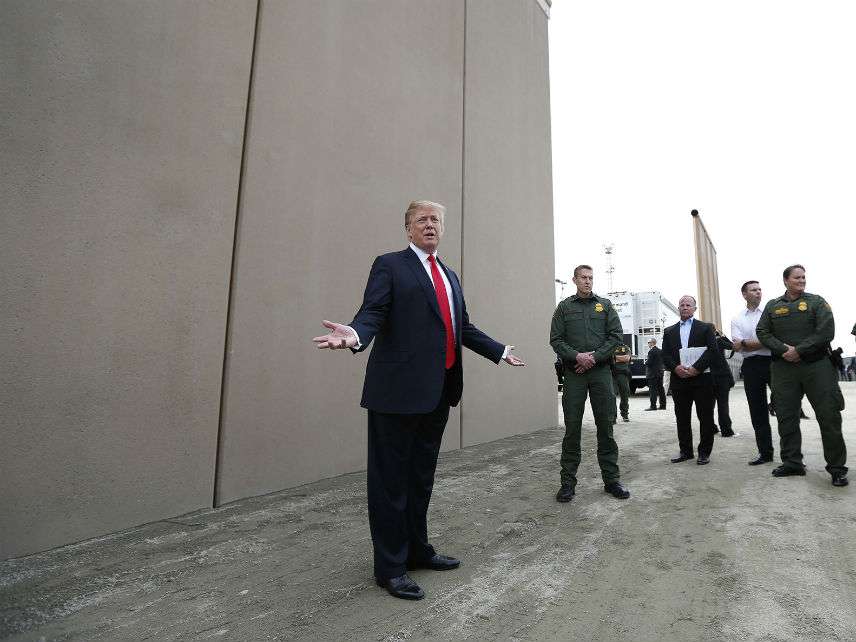Trump Will Probably Lie About Immigration Tonight
The president and his administration have a long track record of basing policy on dystopian falsehoods about terrorists and criminals streaming north.

In a press conference Friday about the border-wall funding he is demanding from Congress in return for reopening the federal government, President Donald Trump told reporters: "This should have been done by all of the presidents that preceded me. And they all know it. Some of them have told me that we should have done it."
Unsurprisingly, given both the president's track record of non-veracity and the media's enthusiasm for documenting it, this anecdote has led to a flurry of headlines such as, "Every living president has refuted Trump's claim about supporting the wall."
Equally unsurprisingly, the president's underlings have embarrassed themselves trying to defend the lie. For instance, Vice President Mike Pence went on the Today show this morning to stammer, soften the initial claim ("I know that the president has said that that was his impression from previous administrations"), and then change the subject.
"Which former presidents told President Trump, as he said, that he should've built a wall? All their representatives have denied that that was the case." @halliejackson to @VP Mike Pence pic.twitter.com/7xAH05aheE
— TODAY (@TODAYshow) January 8, 2019
Yet as far as White House immigration lies go, this exchange was utterly inconsequential. Sure, it's unseemly when a president lies, it's degrading to all his willing defenders, and it expends the scarce resource of journalistic time and outrage (just kidding: this never runs out). But unlike other immigration-related fantasia, the other-presidents-support-me shaggy dog story has not translated into concrete policy action.
From illegal-immigrant voter fraud to the diversity lottery visa, from chain migration to sanctuary cities, immigrant-criminality to terrorist infiltration from the south, the Trump administration has spent two years basing policy and enforcement priorities on dystopian fables. Refugee intake has been slashed, asylum laws have been effectively rewritten via executive order and draconian enforcement changes, the legal immigration machinery has been gummed up with deliberately repellant bureaucracy, and families have been cruelly broken apart in the name of deterrence.
All of these changes affect lives more than some idle White House bluster; all are based on the repetition of lies, particularly regarding the alleged danger to Americans posed by those seeking to cross the US.-Mexico border. Now that candidate Trump's single biggest—and single most unattainable—campaign promise has collided against reality to the point of political impasse, a politically cornered president seeks to persuade a skeptical public tonight that extending and strengthening the existing 654 miles of barriers along the 1,954-mile border is a principle worth closing the federal government over.
What are the chances of Trump not lying while making his case tonight? Judging by his administration's track record on inflating the northbound threat-risk, not very high.

On Friday, White House Spokeswoman Sarah Huckabee Sanders asserted on Fox News that "nearly 4,000 known or suspected terrorists that CPB picked up [in fiscal year 2017] came across our southern border." That assertion is both false and familiar.
During the pre-election migrant-caravan panic, Vice President Pence told a Washington Post forum that "in the last fiscal year we apprehended more than 10 terrorists or suspected terrorists per day at our southern border from countries that are referred to in the lexicon as 'other than Mexico'?that means from the Middle East region." That 10-a-day stat is a staple of administration propaganda about the southern border. And it's "eye-poppingly bogus," in the words of The Washington Post's Aaron Blake.
In fact, according to an NBC News report yesterday, "U.S. Customs and Border Protection encountered only six immigrants at ports of entry on the U.S-Mexico border in the first half of fiscal year 2018 whose names were on a federal government list of known or suspected terrorists, according to CBP data provided to Congress in May 2018." More:
Overall, 41 people on the Terrorist Screening Database were encountered at the southern border from Oct. 1, 2017, to March 31, 2018, but 35 of them were U.S. citizens or lawful permanent residents. Six were classified as non-U.S. persons.
On the northern border, CBP stopped 91 people listed in the database, including 41 who were not American citizens or residents.
Border patrol agents, separate from CBP officers, stopped five immigrants from the database between legal ports of entry over the same time period, but it was unclear from the data which ones were stopped at the northern border versus the southern border.
Further, the State Department concluded in July 2017 that there was "no credible information that any member of a terrorist group has traveled through Mexico to gain access to the United States." So where does that 10-a-day stat come from?
It seems to be the conflation of two separate numbers—the 3,755 people from the government's Known and Suspected Terrorist (KST) list who were stopped at all points of entry (mostly at airports) in fiscal 2017, and the 3,028 "special interest aliens" (SIAs) who were flagged at the southern border. So who are those eight (not 10) SIAs we're catching every day down south?
The Department of Homeland Security's own press release from yesterday trying to put the best possible gloss on recent numerical/classification controversies acknowledges that "the term SIA does not indicate any specific derogatory information about the individual," and that "[not] all SIAs are 'terrorists.'" What are they, then?
Generally, an SIA is a non-U.S. person who, based on an analysis of travel patterns, potentially poses a national security risk to the United States or its interests. Often such individuals or groups are employing travel patterns known or evaluated to possibly have a nexus to terrorism. DHS analysis includes an examination of travel patterns, points of origin, and/or travel segments that are tied to current assessments of national and international threat environments.
As The Washington Post's Salvador Rizzo reported in a useful explainer yesterday:
Alan Bersin, an assistant homeland security secretary in the Obama administration, described them in 2016 as "unauthorized migrants who arrive in the United States from, or are citizens of, several Asian, Middle Eastern, and African countries." For example, a GAO report from 2010 lists "Afghanistan, Iran, Iraq, and Pakistan" as special interest countries.
"While many citizens of these countries migrate for economic reasons or because they are fleeing persecution in their home countries, this group may include migrants who are affiliated with foreign terrorist organizations, intelligence agencies, and organized criminal syndicates," Bersin testified in March 2016. (Emphasis ours.)
Bersin also testified that "the majority of individuals that are traveling, be they from special interest alien countries or other places, we found the large majority of these individuals are actually fleeing violence from other parts of the world[."]
So we've gone from 10 "known or suspected terrorists" caught on the southern border each day to eight people who show up on a not-necessarily-terrorist watchlist, a "large majority" of whom are "actually fleeing violence." No wonder Nielsen is backpedaling behind a cloud of authoritative-sounding vagueness:
The threat is real. The number of terror-watchlisted individuals encountered at our Southern Border has increased over the last two years. The exact number is sensitive and details about these cases are extremely sensitive. But I am sure all Americans would agree that even one terrorist reaching our borders is one too many.
Those italics, contained in the source material, are a useful reminder of what Trump and his administration have really been up to: trying to spin ghastly and all-too-real criminal anecdotes into stubbornly elusive data, in order to sell impossible-to-attain zero tolerance policies that remain popular (solely) among his core base of supporters despite sacrificing the rights of U.S. citizens. Trumpian conservatism, which is the type that currently holds sway in the national GOP, apparently requires vast presidential power grabs and the obliteration of private property rights in rural Texas in order to achieve its politically unpopular goals.
Exaggerating and lying is what the unscrupulous do when they lack confidence in the persuasive power of existing facts. There's no reason not to expect more of it tonight.


Show Comments (319)